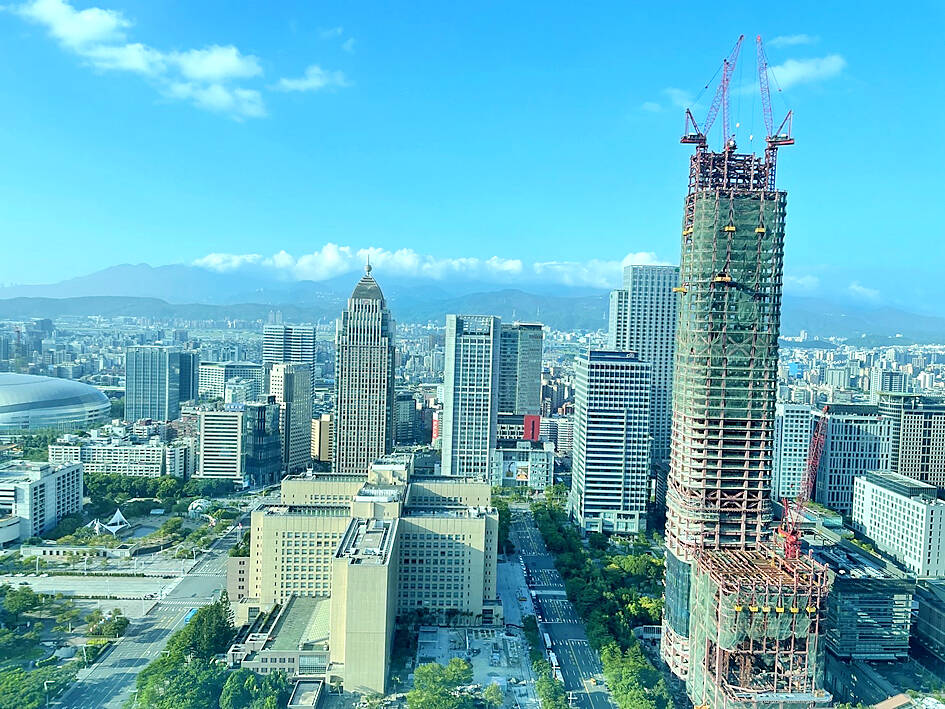Housing deals last month cooled moderately compared with September, despite it traditionally being the high season for property transfers, major real-estate brokers said yesterday.
Evertrust Rehouse Co (永慶房屋) said transactions at its outlets nationwide shed 1 percent from a month earlier, at odds with the seasonal trend.
The absence of a seasonal advance had much to do with Taiwan’s interest rate hikes and the TAIEX’s deep corrections that made prospective home buyers more financially cautious, Evertrust deputy research head Chen Chin-ping (陳金萍) said in a statement.

Photo: Hsu Yi-ping, Taipei Times
Property transfers held steady in Taipei and edged up in New Taipei City, Chen said, adding that the decline widened to 6 percent in Taoyuan.
Housing deals in Tainan gained 10 percent, but dropped 2 percent in Kaohsiung, Chen said, citing the company’s internal data.
Transactions fell 1 percent in Hsinchu and Taichung, she said.
The lackluster showings for last month came despite buying interest picking up 10 percent from the previous month. People hesitated to make offers in the hope of price corrections, Chen said.
Sinyi Realty Inc (信義房屋) shared similar observations, but said that relocation needs underpinned transactions.
People with relocation needs had usually done enough research to close deals after working out pricing differences with sellers, Sinyi research manager Tseng Ching-der (曾進德) said in a separate statement.
Apartments priced between NT$20 million and NT$25 million (US$620,925 and US$776,156) per unit accounted for the majority of deals in Taipei, while apartments valued at NT$7 million to NT$15 million per unit were the majority in New Taipei City, Tseng said, referring to statistics compiled by the real-estate brokerage.
Elsewhere, apartments priced at NT$10 million to NT$15 million had fair chances of attracting buyers, he said.
Taiwan Realty Co (台灣房屋) saw transactions falling 3.3 percent at its offices across Taiwan, as buyers said they needed more time for consideration.
However, the slowdown was the result of price differences rather than a lack of interest, Taiwan Realty research head Charlene Chang (張旭嵐) said in a news release.

The demise of the coal industry left the US’ Appalachian region in tatters, with lost jobs, spoiled water and countless kilometers of abandoned underground mines. Now entrepreneurs are eyeing the rural region with ambitious visions to rebuild its economy by converting old mines into solar power systems and data centers that could help fuel the increasing power demands of the artificial intelligence (AI) boom. One such project is underway by a non-profit team calling itself Energy DELTA (Discovery, Education, Learning and Technology Accelerator) Lab, which is looking to develop energy sources on about 26,305 hectares of old coal land in

Taiwan’s exports soared 56 percent year-on-year to an all-time high of US$64.05 billion last month, propelled by surging global demand for artificial intelligence (AI), high-performance computing and cloud service infrastructure, the Ministry of Finance said yesterday. Department of Statistics Director-General Beatrice Tsai (蔡美娜) called the figure an unexpected upside surprise, citing a wave of technology orders from overseas customers alongside the usual year-end shopping season for technology products. Growth is likely to remain strong this month, she said, projecting a 40 percent to 45 percent expansion on an annual basis. The outperformance could prompt the Directorate-General of Budget, Accounting and

Netflix on Friday faced fierce criticism over its blockbuster deal to acquire Warner Bros Discovery. The streaming giant is already viewed as a pariah in some Hollywood circles, largely due to its reluctance to release content in theaters and its disruption of traditional industry practices. As Netflix emerged as the likely winning bidder for Warner Bros — the studio behind Casablanca, the Harry Potter movies and Friends — Hollywood’s elite launched an aggressive campaign against the acquisition. Titanic director James Cameron called the buyout a “disaster,” while a group of prominent producers are lobbying US Congress to oppose the deal,

Two Chinese chipmakers are attracting strong retail investor demand, buoyed by industry peer Moore Threads Technology Co’s (摩爾線程) stellar debut. The retail portion of MetaX Integrated Circuits (Shanghai) Co’s (上海沐曦) upcoming initial public offering (IPO) was 2,986 times oversubscribed on Friday, according to a filing. Meanwhile, Beijing Onmicro Electronics Co (北京昂瑞微), which makes radio frequency chips, was 2,899 times oversubscribed on Friday, its filing showed. The bids coincided with Moore Threads’ trading debut, which surged 425 percent on Friday after raising 8 billion yuan (US$1.13 billion) on bets that the company could emerge as a viable local competitor to Nvidia